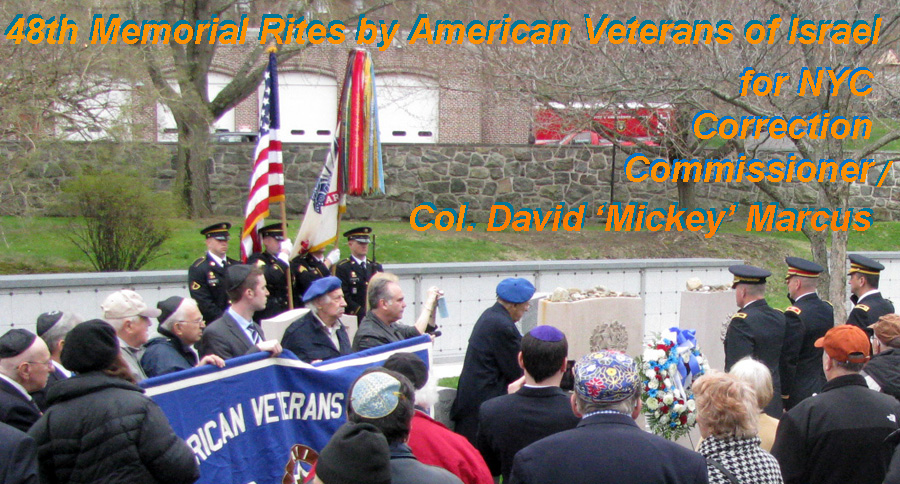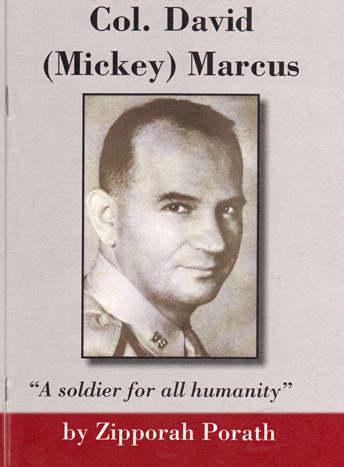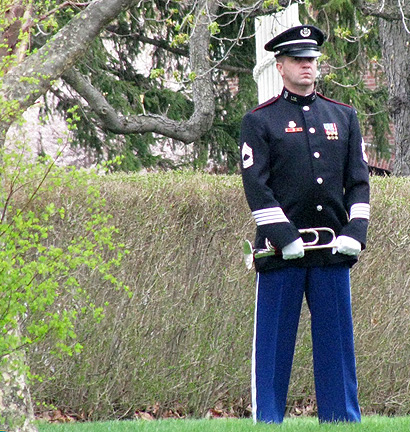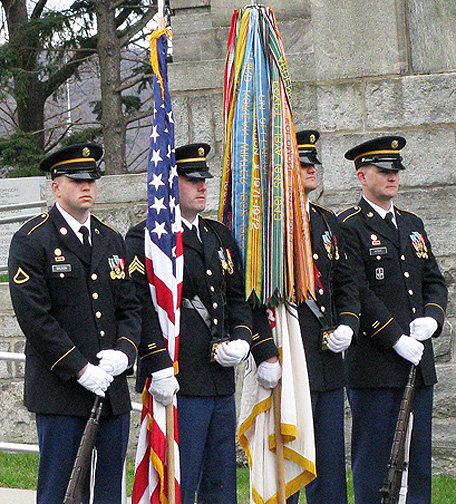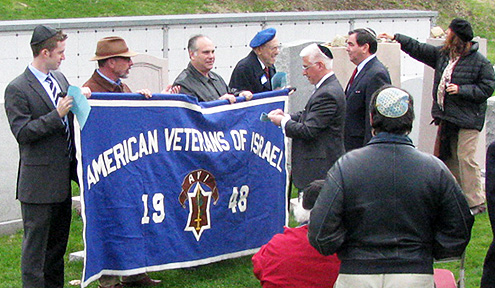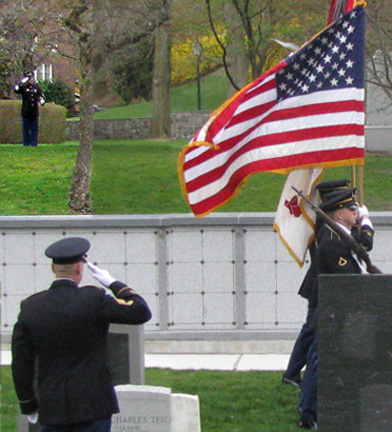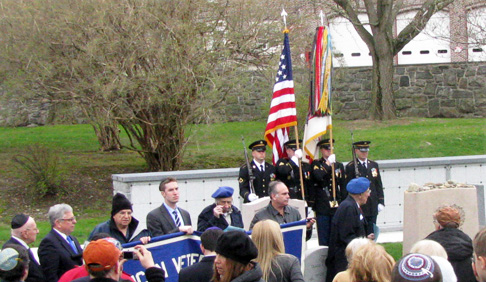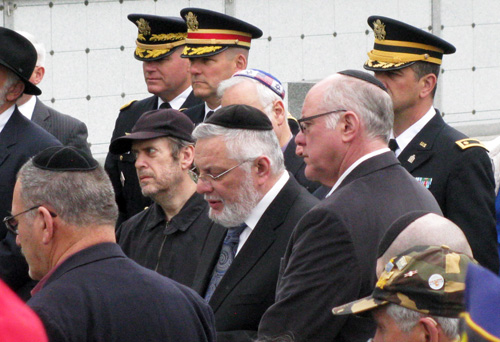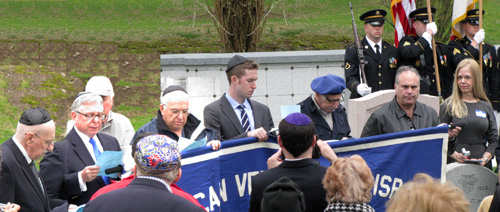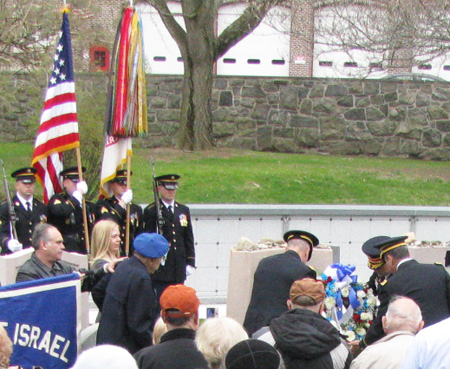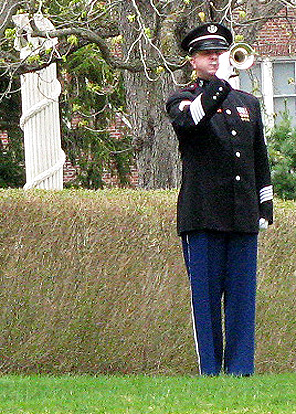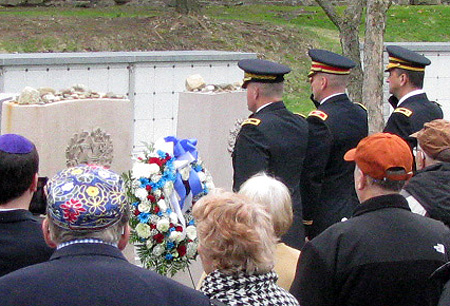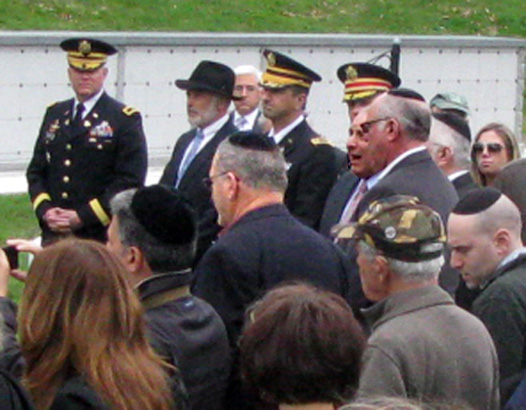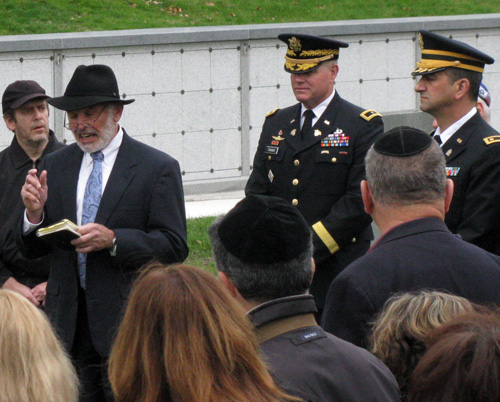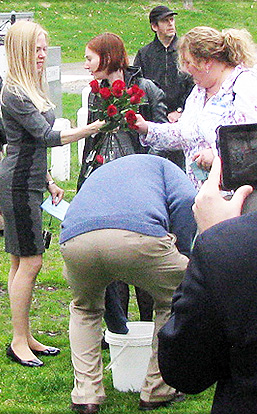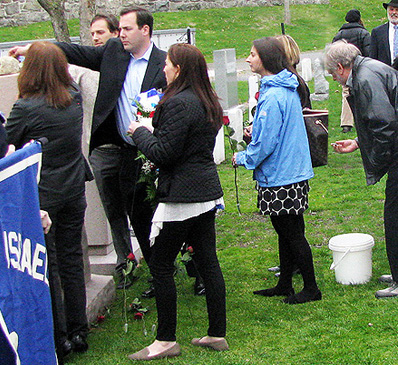Author's note in booklet: Col. David (Mickey) Marcus, a West Point graduate, was recruited at the end of 1947 as military adviser to David Ben-Gurion and the underground Haganah defense forces. . . . On the first anniversary of Marcus's death, Ben-Gurion, then prime minister and minister of defense of the nascent State of Israel, wished to honor Mickey's memory and the heroic role he had played in Israel's War of Independence in a written tribute. . . . He instructed the army Publications Department, Ma'arachot, to interview those who had served with Marcus and had been close to him, while their impressions were still fresh. I was the young American journalist chosen for the assignment. I had arrived in Jerusalem in October 1947 . . . joined the Haganah, served as a medic during the siege of Jerusalem, and stayed on to serve in the IDF and the fledgling Israel Air Force. I never met Mickey Marcus in person as he had been a well-kept military secret until his death. I would have to re-create him for readers from what others would say about him. . . . . RegrettabIy, the original project never saw the light of day. This booklet is based on the interviews I conducted over 60 years ago with those who had recruited Mickey Marcus, with staff officers at GHQ, with ordinary soldiers who had served with him, as well as with others whose lives he touched during the 200 days he was involved in Israel's struggle for survival and independence. Those on-the-spot interviews give a vivid, animated and authentic picture of the man, his motivation and his contribution to the Israel Defense Forces. -- Zipporah Porath
. . . Accepted at West Point on the strength of a spectacular high school athletic record, he gained fame there as a boxer when he won the Intercollegiate Welterweight title. Mickey Marcus graduated West Point in the Class of 1924. After the required stint of military service he went on to study law, became a crusading government lawyer, Treasury department staff attorney, Assistant U.S. Attorney, Municipal Judge - at 34, the youngest judge on the New York bench - and subsequently was rewarded for his public service by being appointed Commissioner of Correction for New York City.
In 1942 he was appointed commandant of the army's new Ranger School developing innovative tactics for jungle fighting for MacArthur's forces in the Pacific. In 1944 he parachuted into Normandy as part of the D- day airborne assault. At the war's end he was .. . . responsible for clearing out the Nazi death camps . . . By V-E day he was a full Colonel and Chief of Planning for the War Department's Civil Affairs bivision, later heading the army's War Crimes division, setting up the Nuremberg Trials. In early 1947, at age 46, . . . Marcus returned home . . .
The first person I interviewed was veteran Haganah commander Shlomo Shamir, who helped recruit Marcus. Shamir said that shortly after November 29, 1947, the day the United Nations voted to partition Palestine, dividing the country into Arab and Jewish states, the Haganah heads and the provisional government chiefs instructed him to put out discreet feelers in America for high-ranking military officers and technical experts to help create a modern army-to-be for the Jewish state- to-be. Shamir was directed to Col. David (Mickey) Marcus . . . known to have a wide circle of friends and acquaintances in the American army. Mickey . . . . culled through lists of the top brass to find retired generals. He was distraught to discover that the generals refused to go without assurances from American authorities that their army status, careers and citizenship would not be jeopardized. Marcus had no such qualms. He had seen firsthand the Nazi atrocities in the liberated Dachau Concentration Camp and was deeply affected by that experience. He was convinced of the urgent need for Holocaust survivors for a safe haven in a sovereign Jewish homeland. Shamir said Marcus's failure to find any top military men who would consent to go made him decide to go himself.
British Mandate Palestine On January 30, 1948, barely a month after their initial contact, Mickey dropped everything and left with Shamir for Palestine. When he parted from his wife at the airport, he hugged her, kissed her and promised her he would return in two months. In order not to arouse the suspicion of the British and to protect his real identity, he took the nom de guerre, Michael (Mickey) Stone . . . . On the afternoon Col. Marcus arrived, he was taken to meet his "boss," Ben-Gurion (BG), with whom he found an immediate rapport. The following day he met the Haganah commanders with whom he would be working most closely. The key person was Yigael Yadin, de facto head of the Haganah and the future Chief of Staff of the Israel Defense Forces. . . .
Yisrael Galili, legendary Haganah leader and close adviser to Ben-Gurion, remembered that at that first GHQ meeting with Marcus the discussion was about training and organization of the army. . . . Inspecting the troops The Haganah's striking force, the Palmach, was headed by Yigal Alon, a dashing, bold leader who later became a brigade commander under Marcus. . . . Marcus coined special nicknames for almost everyone, and immediately called Yigal Alon "Eagle," a charming mispronunciation of his first name. "Eagle" gave Mickey a Palmach pin which he wore on the reverse side of his lapel. He would flash it proudly at every opportunity despite the danger involved as long as the British were still around. Alon accompanied Marcus on his first tour of inspection to Palmach headquarters in a secret mountain hideout in the Galilee. . . . They found battle-weary boys in tattered clothing, coughing and disheartened. No food, no sleep, no letup from the fight or the tension.
"Victory is in the bag" . . . "We couldn't pick out from the group which was the American," Gabby told me. "Yigal spoke to us first. Mickey listened quietly. "A sign on the wall attracted his attention and he asked one of the boys to translate it. . . . . "Soldiers of the Palmach," Mickey began, "I see what you're up against. I see how you're dressed. I hear you coughing. I heard of your successful raid on Sasa. I've just been told what the motto on the wall says. I've listened to your questions, and the answers you received. From all this, I have come to the conclusion this is one of the best armies I have ever seen in the world. I haven't seen infantry better than this anywhere. And I am sure that with such men victory is in the bag."
"I have neither pay, nor beds, nor food. I promise you starvation, thirst, exhausting marches and death. But he who loves his country with more than lip service, will rise up and follow me" . . . . . "Either it's war, or it isn't!" On the way back to town, Mickey told Alon, "Eagle, it is shameful that all the stores in Tel Aviv have clothes and shoes on display in the shop windows while these boys are freezing and go barefoot. "I would break in and raid them, confiscate their goods," he said. "Either it's war, or it isn't. You people only deal with urgent things, and never get around to the important things." Marcus had difficulty accepting that at that time it was not an official war. . . .
In a letter to his wife, he wrote: "What is happening to the conscience of the Jewish American Democrats. "Why don't they really move to lift the embargo? . . . . " The Palmach's Zeide The Grand Old Man of the Palmach, Yitzhak Sadeh, a former wrestler, was captivated by Marcus. Mickey affectionately called him Zeide, the Yiddish word for grandfather. Sadeh recalled the first time they met. "After a GHQ meeting at Haganah headquarters at the Red House a group of us went for lunch to a nearby restaurant, where we stood outside discussing the importance of physical training for an army, a subject close to both our hearts. "Mickey suddenly flopped to the ground to illustrate an exercise. The next day we got together at my place to workout and compete on muscle stretchers and chinning bars."
Two weeks after he arrived in the country, Mickey already knew every significant spot on the map. In that short time he had learned about the enemy, the type of war being fought, and the best way to tackle it. He had been part of the American army's expansion and growth to meet the problems of World War II and understood what Israel would have to face in establishing an army overnight. Remarkable human material In the report Marcus submitted to his "boss" BG a month later, March 2 1948, Marcus said: "I found less than I expected and more than I hoped for." He criticized the lack of administration and transportation, but praised what the partisan army had in abundance - remarkable human material.
The day after receiving the Marcus report, BG contacted his look-outs in America and told them: . . . "(Marcus) has been a great blessing to us. It would be good if you could send at last ten more like him - and at once." "Get organized!" . . . . Mickey tried to persuade the top brass to consider the logic of the American system, where an officer in a branch of a service has direct contact only with three or four superiors. "An army is like a business," he would say. "It has to be run efficiently. You have to know who your boss is and who you are the boss of. In business you lose money, in war you lose lives. . . . "An army isn't just about fighting," he would instruct the Haganah leaders, "it's an organization.
"An army walks on its stomach." Marcus was the first to initiate military thinking on a general staff level and implored them to get organized. . . . . In a private meeting with BG, Marcus spoke of the need to unify the army's command by incorporating the Palmach strike forces more thoroughly into the Haganah. . . . . Yehoshua Perlman of the Ministry for Foreign Affairs . . . . remembers Mickey asking, "If the Arabs attack a certain outpost or objective and don't succeed, do they retreat in full order? How soon afterwards do they stage a second attack? "To what extent is the Arab soldier devoted to the war in Palestine? Does he have personal objectives, or does he fight because he's given orders? Is he an adventurer? Does he intend to rob?" . . . .
Marcus's theories on tactics were based on wrestling and boxing. "A war is like a wrestling match," he would stress, "in that your whole body is put to a test of endurance, with strain on every minute facet. "In boxing you attack suddenly and powerfully, hitting your opponent from all sides, . . . . withdrawing and confusing him. In war, you must do very much the same thing." He put great emphasis on preparing to fight at close quarters in hand-to-hand and face-to-face battles, patrols, infiltrations, physical training, combat, and guts. "Don't rely too much on artillery and bombardment." . . . . Nathan Shaham, an aide, recalls that Mickey would illustrate graphically every operation he was discussing in order to make it comprehensible. He would point to windows and designate them as the artillery. The typewriter became a tank. The lamp was the air force.
Yigal Alon admitted: "We could not always go along with Mickey's ideas. "Basic to our strategy was a program of tactics aimed at achieving boundaries for the newly emerging state. "Sometimes we had to sacrifice good military strategy for a more immediate goal." A multi-faceted personality Mickey Marcus's tremendous vitality and multi-faceted personality had a remarkable impact on everyone he met. His penetrating, sparkling eyes, his high-pitched voice and his mischievous sense of humor were compelling. He got to the core of everyone and permitted everyone to get to the core of him. He was a man of the people who could walk with kings and commoners. People loved him and respected him and were prepared to learn from him.
Mickey Marcus was dynamic when he moved; motionless when he sat. Everything interested him. He knew how to listen and no opinion was ever lost on him. He overcame the language barrier despite the fact that his Hebrew vocabulary was limited.. . . . At the drop of a hat, he would talk knowledgeably on any subject - music, poetry, art and history. He quoted the Bible, Shakespeare and Keats. He would tap dance, sing operatic arias - in a baritone voice - and daven (pray) out loud, or comment on religion, science and philosophy. But, in military matters he was strictly business. BG's secretary said she thought the serious-minded hierarchy of the Haganah initially did not know what to make of this charming, easygoing, jovial, gregarious, good natured man who fraternized with everyone. . . .
| |||||||||||||||||||||||||||||||||||||||||||||||||||||||||||
